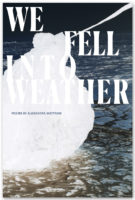
Smyth-sewn Paperback · 80pp · $20 · 9780999491263
At heart conceptual and formally experimental, Alexandra Mattraw’s We fell into weather creates visual and sonic textures that link toxicity—environmental, historical, domestic—with neurodivergence and disease. These poems are alive with musicality and internal rhyme, “the way hay rips scars into wrists the way granite / fields bloom back bruises,” while offering glimpses into the stuff of everyday life—the toddler’s cough, the broken lamp taped back together. In Mattraw’s spare and elegant lines, an image will crystallize briefly as a family drives away from California wildfires, but then disperse like vapor, like “ash . . . Rend[s] the visibility of air.” Attuned to the sublime in nature and in language, this is a poet who invites our close and sustained attention, who invites us to improve ourselves. —Mary-Kim Arnold
“What you can’t see is what brings you,” Alexandra Mattraw writes: “We throttle out of rent, ash CFC storming lung shifts.” An uncanny, raw awareness embodies the space of perception and opening. Mattraw’s primary language becomes action, becomes our phenomenology, our neurodivergence, our fullness: “When allergies heave and blister. When CFC wind. Decibels shake cinder pink jostling pink pill.” There is surprise everywhere in these poems. This is a magical book. —Joseph Lease
Alexandra Mattraw’s We fell into weather is not only essential reading for its presentation of how an individual’s experiences can offer insight into some of the most critical challenges we face today. Her use of image, detail, the placement of language on the page, her diction choices, and her variations regarding syntax—each formal choice contributes to creating a constellation of difference that exposes not only unexpected revelations regarding the speaking agent’s interior perceptions, but also the social environment in which these scenes of intimacy and obsession, history and fantasy, are set. While one tends to see forms as abstract organizing principals, in Mattraw’s poems forms become actors in the drama and members of a chorus offering insight. They can be received in what I’ll call a language of physical dimension, of gesture, of shape and spatial relations. Thus, as we read, wecan begin to perceive how, in our own lives, the forms which we each use to create our understanding of ourselves and our place in the culture we inhabit are as active in opening or limiting our lives as anything in the world we face today. —Rusty Morrison
